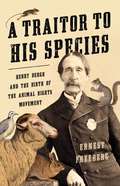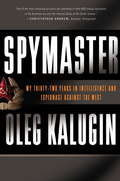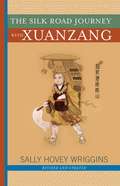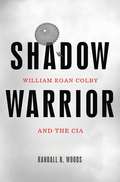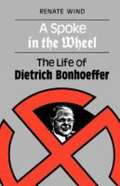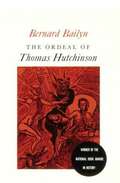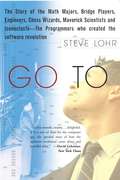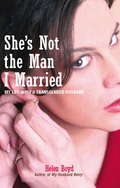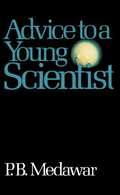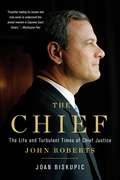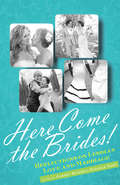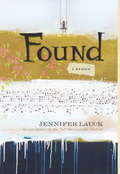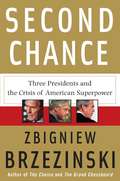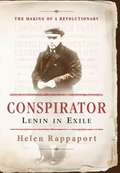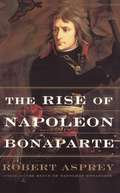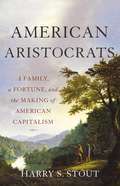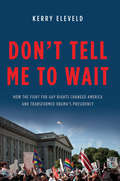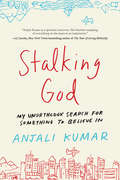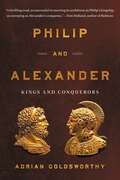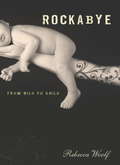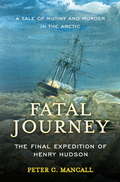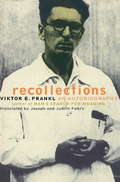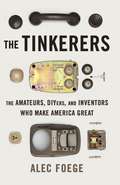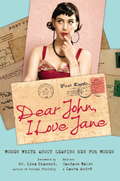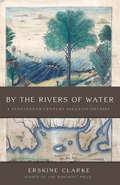- Table View
- List View
A Traitor to His Species: Henry Bergh and the Birth of the Animal Rights Movement
by Ernest FreebergFrom an award-winning historian, the outlandish story of the man who gave rights to animals.In Gilded Age America, people and animals lived cheek-by-jowl in environments that were dirty and dangerous to man and beast alike. The industrial city brought suffering, but it also inspired a compassion for animals that fueled a controversial anti-cruelty movement. From the center of these debates, Henry Bergh launched a shocking campaign to grant rights to animals.A Traitor to His Species is revelatory social history, awash with colorful characters. Cheered on by thousands of men and women who joined his cause, Bergh fought with robber barons, Five Points gangs, and legendary impresario P.T. Barnum, as they pushed for new laws to protect trolley horses, livestock, stray dogs, and other animals. Raucous and entertaining, A Traitor to His Species tells the story of a remarkable man who gave voice to the voiceless and shaped our modern relationship with animals.
Spymaster: My Thirty-two Years in Intelligence and Espionage Against the West
by Oleg KaluginOleg Kalugin oversaw the work of American spies, matched wits with the CIA, and became one of the youngest generals in KGB history. Even so, he grew increasingly disillusioned with the Soviet system. In 1990, he went public, exposing the intelligence agency's shadowy methods. Revised and updated in the light of the KGB's enduring presence in Russian politics, Spymaster is Kalugin's impressively illuminating memoir of the final years of the Soviet Union.
The Silk Road Journey With Xuanzang
by Sally Hovey WrigginsThe Silk Road Journey with Xuanzang tells the saga of the seventh-century Chinese monk Xuanzang, one of China's great heroes, who completed an epic sixteen-year-long journey to discover the heart of Buddhism at its source in India. Eight centuries before Columbus, this intrepid pilgrim traveled 10,000 miles on the Silk Road, meeting most of Asia's important leaders at that time. In this revised and updated edition, Sally Hovey Wriggins, the first Westerner to walk in Xuanzang's footsteps, brings to life a courageous explorer and devoutly religious man. Through Wriggins's telling of Xuanzang's fascinating and extensive journey, the reader comes to know the contours of the Silk Road, Buddhist art and archaeology, the principles of Buddhism, as well as the geography and history of China, Central Asia, and India. The Silk Road Journey with Xuanzang is an inspiring story of human struggle and triumph, and a touchstone for understanding the religions, art, and culture of Asia.
Shadow Warrior: William Egan Colby and the CIA
by Randall B. WoodsWorld War II commando, Cold War spy, and CIA director under presidents Nixon and Ford, William Egan Colby played a critical role in some of the most pivotal events of the twentieth century. A quintessential member of the greatest generation, Colby embodied the moral and strategic ambiguities of the postwar world, and first confronted many of the dilemmas about power and secrecy that America still grapples with today. In "Shadow Warrior," eminent historian Randall B. Woods presents a riveting biography of Colby, revealing that this crusader for global democracy was also drawn to the darker side of American power. Aiming to help reverse the spread of totalitarianism in Europe and Asia, Colby joined the U. S. Army in 1941, just as America entered World War II. He served with distinction in France and Norway, and at the end of the war transitioned into AmericaOCOs first peacetime intelligence agency: the CIA. Fresh from the fight against fascism, Colby zealously redirected his efforts against international communism. He insisted on the importance of fighting communism on the ground, doggedly applying guerilla tactics for counterinsurgency, sabotage, surveillance, and information-gathering on the new battlefields of the Cold War. Over time, these strategies became increasingly ruthless; as head of the CIAOCOs Far East Division, Colby oversaw an endless succession of assassination attempts, coups, secret wars in Laos and Cambodia, and the Phoenix Program, in which 20,000 civilian supporters of the Vietcong were killed. Colby ultimately came clean about many of the CIAOCOs illegal activities, making public a set of internal reportsuknown as the ofamily jewelsOCOuthat haunt the agency to this day. Ostracized from the intelligence community, he died under suspicious circumstancesua murky ending to a life lived in the shadows. Drawing on multiple new sources, including interviews with members of ColbyOCOs family, Woods has crafted a gripping biography of one of the most fascinating and controversial figures of the twentieth century.
A Spoke in the Wheel: The Life of Dietrich Bonhoeffer
by Renate WindThis is an ideal book to introduce Dietrich Bonhoeffer to new generation of readers. Vividly and concisely written, critical as well as appreciative, and containing material which has not been published in English before, it paints an unforgettable portrait of the great German theologian hanged by the Nazis in 1945. What emerges most clearly is the complexity of Bonhoeffer's personality and the lonely course he pursued: sensitive, but taught always to repress his feelings; moving away from his family to read theology, but not feeling at home in his church; ready to sacrifice everything but dogged by a tendency towards narcissism; finding the woman he loved and at that very moment put in a prison from which he would never emerge. Above all, Renate Wind brings out Bonhoeffer's early realization of the horror of Nazi treatment of the Jews and the bravery of his involvement in the resistance against Hitler, his resolve to become a 'spoke in the wheel'. To their shame, many in the churches never forgave Dietrich Bonhoeffer this involvement, and in also calling attention to their failing, this book helps to explain why.
The Ordeal of Thomas Hutchinson
by Bernard Bailyn“This book,” the author writes, “depicts the fortunes of a conservative in a time of radical upheaval and deals with problems of public disorder and ideological commitment.” It is at the same time a dramatic account of the origins of the American Revolution from the viewpoint, not of the winners who became the Founding Fathers, but of the losers, the Loyalists. By portraying the ordeal of the last civilian royal governor of Massachusetts, the author explains “what the human reality was against which the victors struggled” and in doing so makes the story of the Revolution fuller and more comprehensible.
Go To: The Story of the Math Majors, Bridge Players, Engineers, Chess Wizards, Maverick Scientists and Iconoclasts- the Programmers Who Created the Software Revolution
by Steve LohrIn Go To, Steve Lohr chronicles the history of software from the early days of complex mathematical codes mastered by a few thousand to today's era of user-friendly software and over six million professional programmers worldwide. Lohr maps out the unique seductions of programming, and gives us an intimate portrait of the peculiar kind of genius that is drawn to this blend of art, science, and engineering, introducing us to the movers and shakers of the 1950s and the open-source movement of today. With original reporting and deft storytelling, Steve Lohr shows us how software transformed the world, and what it holds in store for our future.
She's Not the Man I Married: My Life with a Transgender Husband
by Helen BoydThis book is a sequel to "My Husband Betty", but delves deeper into the author's own relationship with her husband, and less on the histories of various others. Now we really meet Helen, a rather tomboy-ish adult woman, who falls in love with a man, and later finds out he is a cross-dresser. They marry, as a heterosexual couple. He becomes more and more comfortable in his women's persona, "Betty." This causes Helen to go through a very thoughtful time of learning about and questioning gender issues of all types. How masculine of a woman can she be and still be "woman"? At what point is she labeled Butch" Is that true or not? Does it bother her? How does "trans" change people? Transsexuals, genderqueers who prefer the non-binary middle ground rather than the either/or of male/female, transfolks taking hormones or not, transfolks planning just "top surgery" but not "bottom surgery," safety issues, mainstream America's perceptions, etc. If Betty becomes a full time woman, does that mean they are a lesbian couple, even though they and particularly Helen are heterosexual? Throughout, Helen and Betty remain married and a loving couple, even though they don't know what will happen with them. This non-fiction book, told from the 1st person, presents valid questions of gender vs. sexual orientation, "queer community" vs. mainstream America, Cross-dressers vs. full post-surgical transsexuals, etc. There is much more of Helen's ponderings than there is of their day to day life, although that is included as examples. By the end, it is still unknown whether Betty will fully transition to a female gender or not. This is a very thought provoking book.
Advice to a Young Scientist
by P. B. MedawarTo those interested in a life in science, Sir Peter Medawar, Nobel laureate, deflates the myths of invincibility, superiority, and genius; instead, he demonstrates it is common sense and an inquiring mind that are essential to the scientist’s calling. He deflates the myths surrounding scientists--invincibility, superiority, and genius; instead, he argues that it is common sense and an inquiring mind that are essential to the makeup of a scientist. He delivers many wry observations on how to choose a research topic, how to get along wih collaborators and older scientists and administrators, how (and how not) to present a scientific paper, and how to cope with culturally ”superior” specialists in the arts and humanities.
The Chief: The Life and Turbulent Times of Chief Justice John Roberts
by Joan BiskupicAn incisive biography of the Supreme Court's enigmatic Chief Justice, taking us inside the momentous legal decisions of his tenure so far John Roberts was named to the Supreme Court in 2005 claiming he would act as a neutral umpire in deciding cases. His critics argue he has been anything but, pointing to his conservative victories on voting rights and campaign finance. Yet he broke from orthodoxy in his decision to preserve Obamacare. How are we to understand the motives of the most powerful judge in the land? In The Chief, award-winning journalist Joan Biskupic contends that Roberts is torn between two, often divergent, priorities: to carry out a conservative agenda, and to protect the Court's image and his place in history. Biskupic shows how Roberts's dual commitments have fostered distrust among his colleagues, with major consequences for the law. Trenchant and authoritative, The Chief reveals the making of a justice and the drama on this nation's highest court.
Here Come the Brides!: Reflections on Lesbian Love and Marriage
by Michele Kort Audrey BilgerMarriage today isn't what it used to be: for better, not for worse. As same-sex weddings are becoming more common, the classic love-story happy ending is taking on a decidedly new twist, everyone has a fresh role to play, and supporters and opponents of gay marriage alike are finding themselves in the midst of a revolution that's redefining marriage-both as a personal choice and as an institution-as we know it. InHere Come the Brides!,editors Audrey Bilger and Michele Kort gather together the voices of women taking part in-and shaping-this major historical shift. Representing a diversity of points of view in terms of race, class, ethnicity, and gender identification, this collection of essays, stories, and visual images takes a multidimensional look at how opening up the traditional order of "man and wife" to include the possibility of "wife and wife" is altering our social landscape. From wedding pictures and images of protest signs to comical anecdotes and sober philosophical analyses,Here Come the Brides!is an exploration of how the legalization of same-sex marriages has irrevocably changed the way lesbians think about their unions and their lives-and a celebration of the dream of lesbian happily-ever-afters.
Found: A Memoir
by Jennifer LauckFound is Jennifer Lauck's sequel to her New York Times bestseller Blackbird: A Childhood Lost and Found. More than one woman's search for her biological parents, Found is a story of loss, adjustment, and survival. Lauck's investigation into her own troubled past leads her to research that shows the profound trauma undergone by infants when they're separated from their birth mothers-a finding that provides a framework for her writing as well as her life.Though Lauck's story is centered around her search for her birth mother, it's also about her quest to overcome her displacement, her desire to please and fit in, and her lack of a sense of self-all issues she attributes to having been adopted, and also to having lost her adoptive parents at the early age of nine. Throughout her thirties and early forties, she tries to overcome her struggles by becoming a mother and by pursuing a spiritual path she hopes will lead to wholeness, but she discovers that the elusive peace she has been seeking can only come through investigating-and coming to terms with-her past.Found is a powerful story of belonging, connectedness, and personal truths, in which Lauck lays bare the experience of a woman searching for her identity. Her assertions about mother and child will be a comfort to some in the adoptive community, and distressing to others; but her primary motive is to offer another perspective, and to give voice to the adoptive children who may be having trouble making sense of their own experience.
Second Chance: Three Presidents and the Crisis of American Superpower
by Zbigniew BrzezinskiAmerica’s most distinguished commentator on foreign policy, former National Security Adviser Zbigniew Brzezinski, offers a reasoned but unsparing assessment of the last three presidential administrations’ foreign policy. Though spanning less than two decades, these administrations cover a vitally important turning point in world history: the period in which the United States, having emerged from the Cold War with unprecedented power and prestige, managed to squander both in a remarkably short time. This is a tale of decline: from the competent but conventional thinking of the first Bush administration, to the well-intentioned self-indulgence of the Clinton administration, to the mortgaging of America’s future by the "suicidal statecraft” of the second Bush administration. Brzezinski concludes with a chapter on how America can regain its lost prestige. This scholarly yet highly opinionated book is sure to be both controversial and influential.
Conspirator: Lenin in Exile
by Helen RappaportThe father of Communist Russia, Vladimir Ilych Lenin now seems to have emerged fully formed in the turbulent wake ofWorldWar I and the Russian Revolution. But Lenin’s character was in fact forged much earlier, over the course of years spent in exile, constantly on the move, and in disguise. In Conspirator, Russian historian Helen Rappaport narrates the compelling story of Lenin’s life and political activities in the years leading up to the revolution. As he scuttled between the glittering capital cities of Europe--from London and Munich to Vienna and Prague--Lenin found support among fellow émigrés and revolutionaries in the underground movement. He came to lead a ring of conspirators, many of whom would give their lives in service to his schemes. A riveting account of Lenin’s little-known early life, Conspirator tracks in gripping detail the formation of one of the great revolutionaries of the twentieth century.
The Rise of Napoleon Bonaparte
by Robert B. AspreyEver since 1821, when he died at age fifty-one on the forlorn and windswept island of St. Helena, Napoleon Bonaparte has been remembered as either demi-god or devil incarnate. In The Rise of Napoleon Bonaparte, the first volume of a two-volume cradle-to-grave biography, Robert Asprey instead treats him as a human being. Asprey tells this fascinating, tragic tale in lush narrative detail. The Rise of Napoleon Bonaparte is an exciting, reckless thrill ride as Asprey charts Napoleon's vertiginous ascent to fame and the height of power. Here is Napoleon as he was-not saint, not sinner, but a man dedicated to and ultimately devoured by his vision of himself, his empire, and his world.
American Aristocrats: A Family, a Fortune, and the Making of American Capitalism
by Harry S. StoutThe story of an ambitious family at the forefront of the great middle-class land grab that shaped early American capitalismAmerican Aristocrats is a multigenerational biography of the Andersons of Kentucky, a family of strivers who passionately believed in the promise of America. Beginning in 1773 with the family patriarch, a twice-wounded Revolutionary War hero, the Andersons amassed land throughout what was then the American west. As the eminent religious historian Harry S. Stout argues, the story of the Andersons is the story of America's experiment in republican capitalism. Congressmen, diplomats, and military generals, the Andersons enthusiastically embraced the emerging American gospel of land speculation. In the process, they became apologists for slavery and Indian removal, and worried anxiously that the volatility of the market might lead them to ruin.Drawing on a vast store of Anderson family records, Stout reconstructs their journey to great wealth as they rode out the cataclysms of their time, from financial panics to the Civil War and beyond. Through the Andersons we see how the lure of wealth shaped American capitalism and the nation's continental aspirations.
Don't Tell Me to Wait: How the Fight for Gay Rights Changed America and Transformed Obama's Presidency
by Kerry EleveldAs a candidate in 2008, Barack Obama distanced himself from same-sex marriage, saying he believed marriage was “a sacred union” between a man and a woman. In 2012, he did just the opposite, proclaiming it was “important” for him to affirm the right of same-sex couples to marry. This dramatic about-face put the most powerful man in the world at the front of the battle for gay rights, giving LGBT Americans and their advocates an invaluable ally in their struggle for freedom. Just one year later, the Supreme Court would strike down key provisions of the Defense of Marriage Act, and no Democratic presidential nominee would ever again shun marriage equality. As former Advocate journalist Kerry Eleveld shows, Obama’s support transformed the issue of gay rights from a political liability into an electoral imperative, and in Don't Tell Me to Wait she offers a boots-on-the-ground account of how gay rights activists pushed the president to this political tipping point. Obama’s “evolution” on marriage equality was not the result of a benevolent politician who entered the Oval Office with a wealth of good intentions. Rather, pressure from lesbian, gay, bisexual, and transgender activists changed the conversation, issue by issue. As a result of the protests and outcry following the passage of California’s same-sex marriage ban, Obama realized that overturning the military’s “Don’t Ask, Don’t Tell” policy was the one 2008 campaign promise he couldn’t ignore. While pledges to other progressive constituencies fell apart during Obama’s first two years in office, the LGBT rights movement protested the administration’s fecklessness early and often. By the time the sun set on the 111th Congress, the “Don’t Ask, Don’t Tell” repeal had become the sole piece of major progressive legislation to become law. The repeal’s overwhelming success and popularity paved the way for other LGBT advances, including the president’s eventual embrace of the freedom to marry. With unprecedented access and unparalleled insights into this hot-button issue, Don't Tell Me to Wait captures a critical moment in LGBT history and demonstrates the power of activism to change the course of a presidency—and a nation.
Stalking God: My Unorthodox Search for Something to Believe In
by Anjali KumarAnjali Kumar, a pragmatic lawyer for Google, was part of a rapidly growing population in America: highly spiritual but religiously uncommitted. But when her daughter was born, she became compelled to find God--or at least some kind of enlightenment.Convinced that traditional religions were not a fit for her, and knowing that she couldn't simply Google an answer to "What is the meaning of life?", Kumar set out on a spiritual pilgrimage, looking for answers--and nothing was off limits or too unorthodox. She headed to the mountains of Peru to learn from the shamans, attended the techie haunt of Burning Man, practiced transcendental meditation, convened with angels, and visited saints, goddesses, witches, and faith healers. She even hired a medium to convene with the dead. Kumar's lighthearted story offers a revealing look at the timeless and vexing issue of spirituality in an era when more and more people are walking away from formal religions. Narrated from the open-minded perspective of a spiritual seeker rather than a religious scholar, Kumar offers an honest account of some of the less than mainstream spiritual practices that are followed by millions of people in the world today as she searches for the answers to life's most universal questions: Why are we here? What happens when we die? Is there a God?
Philip and Alexander: Kings and Conquerors
by Adrian GoldsworthyThis definitive biography of one of history's most influential father-son duos tells the story of two rulers who gripped the world -- and their rise and fall from power.Alexander the Great's conquests staggered the world. He led his army across thousands of miles, overthrowing the greatest empires of his time and building a new one in their place. He claimed to be the son of a god, but he was actually the son of Philip II of Macedon.Philip inherited a minor kingdom that was on the verge of dismemberment, but despite his youth and inexperience, he made Macedonia dominant throughout Greece. It was Philip who created the armies that Alexander led into war against Persia. In Philip and Alexander, classical historian Adrian Goldsworthy shows that without the work and influence of his father, Alexander could not have achieved so much. This is the groundbreaking biography of two men who together conquered the world.
Rockabye: From Wild to Child
by Rebecca WoolfRockabye is the lively memoir of a spontaneous young city-girl who becomes unexpectedly pregnant. That city-girl is Rebecca Woolf, who at 23, after the "holy shit, I'm pregnant" realization, decides to keep the baby, marry the boyfriend (in Vegas no less), and figure out how to wed her rock n' roll lifestyle and impending motherhood.With humor, honesty, and renegade insight, Rebecca makes the transition from life as an odd-job doing commitment-phobic, chain-smoking, irresponsible party-girl to life as a work-at-home mother with a different kind of social life. Throughout, Rebecca doesn't relinquish the token qualities of her free-spirited, pre-baby self; rebelling against both the "soccer mom," and "young mother" stereotypes, challenging herself to grow up without outgrowing her dreams, and most importantly embracing motherhood without a map.Rockabye explores the coming together of mother and son and their mutual coming of age. How does Rebecca adapt to motherhood? By acting on instinct and maintaining a strong sense of self, breaking rules (sometimes her own) in the process and building her own adventures out of legos and alphabet blocks.
Fatal Journey: The Final Expedition of Henry Hudson
by Peter MancallThe English explorer Henry Hudson devoted his life to the search for a water route through America, becoming the first European to navigate the Hudson River in the process. In Fatal Journey, acclaimed historian and biographer Peter C. Mancall narrates Hudson’s final expedition. In the winter of 1610, after navigating dangerous fields of icebergs near the northern tip of Labrador, Hudson’s small ship became trapped in winter ice. Provisions grew scarce and tensions mounted amongst the crew. Within months, the men mutinied, forcing Hudson, his teenage son, and seven other men into a skiff, which they left floating in the Hudson Bay. A story of exploration, desperation, and icebound tragedy, Fatal Journey vividly chronicles the undoing of the great explorer, not by an angry ocean, but at the hands of his own men.
Recollections: An Autobiography
by Viktor FranklBorn in 1905 in the center of the crumbling Austro-Hungarian Empire, Viktor Frankl was a witness to the great political, philosophical, and scientific upheavals of the twentieth century. In these stirring recollections, Frankl describes how as a young doctor of neurology in prewar Vienna his disagreements with Freud and Adler led to the development of "the third Viennese School of Psychotherapy," known as logotherapy; recounts his harrowing trials in four concentration camps during the War; and reflects on the celebrity brought by the publication of Man's Search for Meaning in 1945.
The Tinkerers: The Amateurs, DIYers, and Inventors Who Make America Great
by Alec FoegeHaving completed her transition from a manufacturing economy, America - it is said - has stopped making things. When there are breakthroughs in engineering and design, it's usually thanks to a team of corporate researchers trying to squeeze out more profit. But once upon a time, the United States was a nation of tinkerers. Amateurs and professionals alike applied their ingenuity and talent to the problems of their day, coming up with innovative solutions that at once channeled the optimistic spirit of America and kept that spirit alive. Guided by the curiosity of an inquiring mind, a desire to know how things work, and a belief that anything can be improved, they laid the foundations for the American century.When Alexander Graham Bell beat Thomas Edison to the invention of the telephone, Edison fiddled around with the transmitter and receiver until he produced an equally revolutionary machine - the phonograph. When Thomas MacDonald observed the hardship that a lack of good roads imposed on his fellow Iowans, he began a road-building project that eventually morphed into the interstate highway system. Some of the people profiled in this book attended the finest engineering schools in the world; some, like Microsoft's former chief technology officer Nathan Myhrvold, had no formal training in their chosen fields. Some see themselves as solo visionaries; others emphasize the importance of working in teams. What binds them together is an ability to imagine new systems and subvert old ones, to see fresh potential in existing technologies, and to apply technical know-how to the problems of their day.In The Tinkerers, Alec Foege presents a version of American history told through feats of engineering, large and small. He argues that reports of tinkering's death have been greatly exaggerated; since World War II, it has been the guiding force behind projects from corporate-sponsored innovations (the personal computer, Ethernet) to smaller scale inventions with great potential (a machine that can make low-cost eyeglass lenses for people in impoverished countries, a device that uses lasers to shoot malarial mosquitoes out of the sky). Think tanks and companies have recognized the benefits of tinkering and have done their best to harness and institutionalize it. But as systems become more complex, budding inventors may become intimidated. Foege argues that this would be an enormous loss to a nation that achieved its strength largely thanks to the accomplishments of its innovators. He shows us how tinkering remains, in new and unexpected forms, at the heart of American society and culture.
Dear John, I Love Jane: Women Write About Leaving Men for Women
by Candace Walsh Ph.D. Lisa Diamond Laura AndréThe new buzzword in female sexuality is "sexual fluidity"-the idea that for many women, sexual identity can shift over time, often in the direction of same-sex relationships. Examples abound in popular culture, from actress Cynthia Nixon, who left her male partner of 15 years to be with a woman, to writer and comedienne Carol Leifer, who divorced her husband for the same reason.In a culture increasingly open to accepting this fluidity, Dear John, I Love Jane is a timely, fiercely candid exploration of female sexuality and personal choice. The book is comprised of essays written by a broad spectrum of women, including a number of well-known writers and personalities. Their stories are sometimes funny, sometimes painful-but always achingly honest-accounts of leaving a man for a woman, and the consequences of making such a choice.Arousing, inspiring, bawdy, bold, and heartfelt, Dear John, I Love Jane is an engrossing reflection of a new era of female sexuality.
By the Rivers of Water: A Nineteenth-Century Atlantic Odyssey
by Erskine ClarkeIn late 1832, a young missionary couple sailed from the Chesapeake Bay, headed for western Africa. John Leighton Wilson and his wife, Jane, were traveling to the colony of Liberia, where they--and their fellow passengers, mostly liberated slaves and freeborn African Americans--hoped to find an alternative to the inequality of the American South. Soon after their arrival, though, conflict erupted between the settlers and their Grebo and Mpongwe neighbors, shattering the Wilsons’ utopian dreams. The true nightmare, however, came when they returned to the United States. Confronting an onrushing war, the Wilsons were forced to make a terrible choice, revealing with tragic finality where--and with whom--they felt they truly belonged. A sweeping transatlantic story of good intentions and cruel consequences, By the Rivers of Water offers a humane portrait of two very different worlds, both riven by war and racial hatred and sustained by deep--and, occasionally, shared--faiths.
